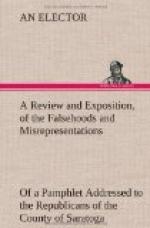The Anglo-Saxon preferred “politic courses” to accepting the Irish soldier’s challenge, even where all the advantage was conceded by the Irishman to his foe and all the risks, save that of treachery (a very necessary precaution in dealing with the English in Ireland), cheerfully accepted by the Celt.
This advantage of the “better bodies” the Irish retained beyond all question up to the Famine. It was upon it alone that the Wexford peasantry relied in 1798, and with and by it alone that they again and again, armed with but pike and scythe swept disciplined regiments of English mercenaries in headlong rout from the field.
This physical superiority of his countrymen was frequently referred to by O’Connell as one of the forces he relied on. With the decay of all things Irish that has followed the Famine, these physical attributes have declined along with so much else that was typical of the nation and the man.
It could not to-day be fearlessly affirmed that sixty Irishmen were more than a match for one hundred Englishmen; yet depleted as it is by the emigration of its strongest and healthiest children, by growing sickness and a changed and deteriorated diet the Irish race still presents a type, superior physically, intellectually and morally to the English. It was on Irish soldiers that the English chiefly relied in the Boer War, and it is no exaggeration to say that could all the Irishmen in the ranks of the British army have been withdrawn, a purely British force would have failed to end the war and the Dutch would have remained masters of the field in South Africa.
It was the inglorious part of Ireland to be linked with those “methods of barbarism” she herself knew only too well, in extinguishing the independence of a people who were attacked by the same enemy and sacrificed to the same greed that had destroyed her own freedom.
Unhappy, indeed, is it for mankind, as for her own fate and honour that Ireland should be forced by dire stress of fortune to aid her imperial wrecker in wrecking the fortune and freedom of brave men elsewhere.
That these physical qualities of Irishmen, even with a population now only one tenth that of Great Britain are still of value to the empire, Mr. Churchill’s speech on the Home Rule Bill made frankly clear (February, 1913). We now learn that the First Lord of the Admiralty has decided to establish a new training squadron, “with a base at Queenstown,” where it is hoped to induce with the bribe of “self-government” the youth of Cork and Munster to again man the British fleet as they did in the days of Nelson, and we are even told that the prospects of brisk recruiting are “politically favourable.”
Carthage got her soldiers from Spain, her seamen, her slingers from the Balearic Islands and the coasts of Africa, her money from the trade of the world. Rome beat her, but she did not leave a defeated Carthage to still levy toll of men and mind on those external sources of supply.




